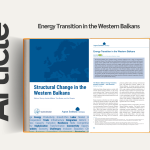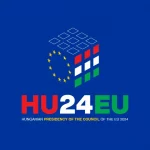Ana-Maria Boromisa, PhD, the Head of the Department for International Economic and Political Relations, participated on May 22 in the webinar of the German Society for International Cooperation (Deutsche Gesellschaft für Internationale Zusammenarbeit – GIZ) named Gender-sensitive energy transition and workforce empowerment in the Western Balkans.
Dr. Boromisa presented a labor market effect analysis: Energy transition and jobs in the Western Balkans, which investigated the impact of the energy transition on employment in six Western Balkan countries: Albania, Bosnia and Herzegovina, Kosovo, Montenegro, North Macedonia, and Serbia. The research highlighted the dependence of the Western Balkans region on coal and outdated energy infrastructure. The transition to renewable energy sources is key to achieving environmental goals, but it also brings complex challenges to the labor market, especially for older men employed in the fossil fuel industry. Therefore, Dr. Boromisa stressed the importance of proactive planning of the labor market to ensure a fair and equal energy transition.
Dr. Boromisa was also part of the panel discussion along with Fiona Imami and Marta Schulte-Fischedick who brought their expert perspectives on the Just Transition framework and gender responsiveness in energy transition, respectively.
You can find the research here.
The authors of the research are the Institute for Development and International Relations (IRMO) and the Center for Economic, Technological and Environmental Development Sarajevo (CETEOR): Valentina Vučković, Ana-Maria Boromisa, Sanja Tišma, Adna Šovšić Kurešepi and Hamid Mehinović. The research was designed and developed under the supervision of Ergi Bregasi, Advisor on Just Energy Transition to the “Green Agenda: Decarbonization of Electricity Sector in the Western Balkans”, as part of the Regional Climate Partnership between Germany and Western Balkans.






